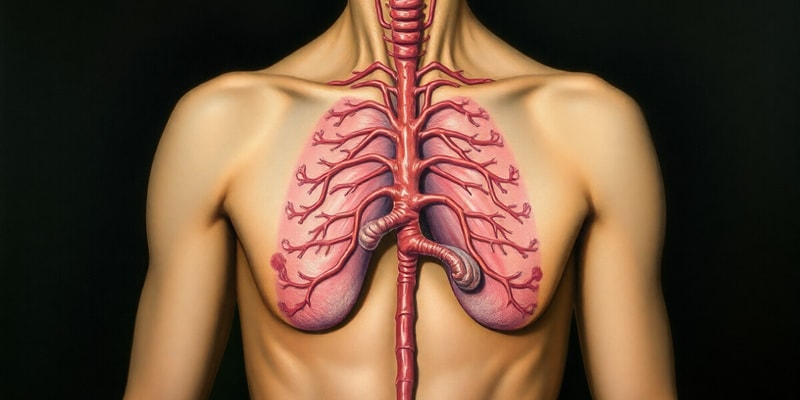Podcast Beta
Questions and Answers
Which statement accurately describes the function of target cells in relation to hormones?
What distinguishes endocrine glands from exocrine glands?
Which of the following hormones is classified as a steroid hormone?
How does the pituitary gland influence body processes compared to other endocrine glands?
Signup and view all the answers
Which of the following statements correctly describes the synthesis of nonsteroid hormones?
Signup and view all the answers
What is the primary function of Thyroid-stimulating Hormone (TSH)?
Signup and view all the answers
Which condition is a result of hypersecretion of growth hormones during adolescence?
Signup and view all the answers
Which hormone from the anterior pituitary directly influences reproduction?
Signup and view all the answers
What is a potential consequence of hyposecretion of growth hormones?
Signup and view all the answers
Which of the following hormonal changes take place under the direction of the hypothalamus?
Signup and view all the answers
What hormone is primarily responsible for stimulating uterine contraction during childbirth?
Signup and view all the answers
During which phase is growth hormone primarily secreted by the pituitary gland?
Signup and view all the answers
Which part of the adrenal gland is responsible for secreting catecholamines?
Signup and view all the answers
What distinguishes the adrenal cortex from the adrenal medulla?
Signup and view all the answers
Which statement about the posterior pituitary is true?
Signup and view all the answers
Study Notes
Overview of the Endocrine System
- Composed of various glands and specialized cells that secrete hormones into the bloodstream.
- Hormones communicate and regulate functions across different organs.
Target Cells
- Specific cells equipped with receptors for particular hormones.
- Hormones circulate in the bloodstream but only influence target cells with matching receptors.
Endocrine vs. Exocrine Glands
- Endocrine glands release hormones directly into the bloodstream, affecting internal bodily functions.
- Exocrine glands have ducts that lead to an external environment.
Hormone Classification
- Hormones are classified into steroid and nonsteroid types.
- Steroid hormones are derived from cholesterol (e.g., sex hormones, aldosterone).
- Nonsteroid hormones are peptide-based, synthesized from amino acids.
Pituitary Gland and Hypothalamus
- The pituitary gland, located beneath the hypothalamus, significantly influences bodily processes.
- Comprises two parts: anterior pituitary and posterior pituitary.
Anterior Pituitary
- Larger segment made up of glandular tissue.
- Produces and releases crucial hormones under hypothalamic control.
Hormones of the Anterior Pituitary
- Thyroid-stimulating Hormone (TSH): Stimulates thyroid hormone secretion.
- Prolactin: Promotes milk production in mammary glands.
- Adrenocorticotropic Hormone (ACTH): Stimulates corticosteroid release from the adrenal cortex.
- Growth Hormone (GH, Somatotropin): Enhances protein synthesis throughout the body.
- Luteinizing Hormone: Triggers ovulation and estrogen production.
- Follicle-Stimulating Hormone (FSH): Stimulates egg production in females and sperm in males.
Hypersecretion Effects
- Too much growth hormone leads to Gigantism (excessive skeletal growth).
- In adults, it can cause Acromegaly (disproportionate growth of hands, feet, and face).
Hyposecretion Effects
- Lack of growth hormone results in Pituitary Dwarfism in children.
Posterior Pituitary
- Composed of neural tissue and stores hormones produced by the hypothalamus.
- Key hormones include:
- Antidiuretic Hormone (ADH): Reduces urine volume and prevents dehydration.
- Oxytocin: Stimulates uterine contractions during childbirth and milk release during lactation.
Regulation of Pituitary Secretions
- Hormone release is not constant; it occurs in phases.
- Growth hormone peaks at night; Luteinizing Hormone (LH) peaks in the menstrual cycle.
Adrenal Glands
- Located atop each kidney, consisting of two main areas:
- Adrenal Medulla: Inner region composed of modified neurons, part of the sympathetic nervous system.
- Adrenal Cortex: Outer portion that secretes steroid hormones known as corticosteroids and produces catecholamines (epinephrine and norepinephrine) from the medulla.
Studying That Suits You
Use AI to generate personalized quizzes and flashcards to suit your learning preferences.
Description
This quiz explores the fundamental aspects of the endocrine system, including hormone functions, target cells, and the distinction between endocrine and exocrine glands. Additionally, it covers hormone classification and the roles of key glands like the pituitary gland and hypothalamus. Test your understanding of how hormones regulate bodily functions and the structures involved.




